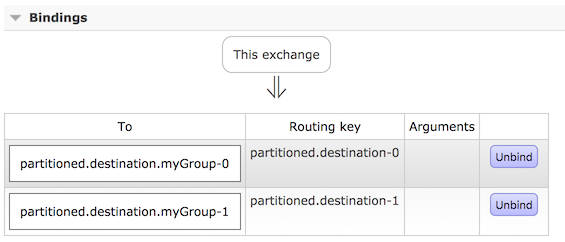|
For the latest stable version, please use spring-cloud-stream 5.0.1! |
Partitioning with the RabbitMQ Binder
RabbitMQ does not support partitioning natively.
Sometimes, it is advantageous to send data to specific partitions — for example, when you want to strictly order message processing, all messages for a particular customer should go to the same partition.
The RabbitMessageChannelBinder provides partitioning by binding a queue for each partition to the destination exchange.
The following Java and YAML examples show how to configure the producer:
@SpringBootApplication
public class RabbitPartitionProducerApplication {
private static final Random RANDOM = new Random(System.currentTimeMillis());
private static final String[] data = new String[] {
"abc1", "def1", "qux1",
"abc2", "def2", "qux2",
"abc3", "def3", "qux3",
"abc4", "def4", "qux4",
};
public static void main(String[] args) {
new SpringApplicationBuilder(RabbitPartitionProducerApplication.class)
.web(false)
.run(args);
}
@Bean
public Supplier<Message<?>> generate() {
return () -> {
String value = data[RANDOM.nextInt(data.length)];
System.out.println("Sending: " + value);
return MessageBuilder.withPayload(value)
.setHeader("partitionKey", value)
.build();
};
}
} spring:
cloud:
stream:
bindings:
generate-out-0:
destination: partitioned.destination
producer:
partitioned: true
partition-key-expression: headers['partitionKey']
partition-count: 2
required-groups:
- myGroup|
The configuration in the prececing example uses the default partitioning ( The |
The following configuration provisions a topic exchange:

The following queues are bound to that exchange:

The following bindings associate the queues to the exchange:

The following Java and YAML examples continue the previous examples and show how to configure the consumer:
@SpringBootApplication
public class RabbitPartitionConsumerApplication {
public static void main(String[] args) {
new SpringApplicationBuilder(RabbitPartitionConsumerApplication.class)
.web(false)
.run(args);
}
@Bean
public Consumer<Message<String>> listen() {
return message -> {
String queue =- message.getHeaders().get(AmqpHeaders.CONSUMER_QUEUE);
System.out.println(in + " received from queue " + queue);
};
}
} spring:
cloud:
stream:
bindings:
listen-in-0:
destination: partitioned.destination
group: myGroup
consumer:
partitioned: true
instance-index: 0
The RabbitMessageChannelBinder does not support dynamic scaling.
There must be at least one consumer per partition.
The consumer’s instanceIndex is used to indicate which partition is consumed.
Platforms such as Cloud Foundry can have only one instance with an instanceIndex.
|

